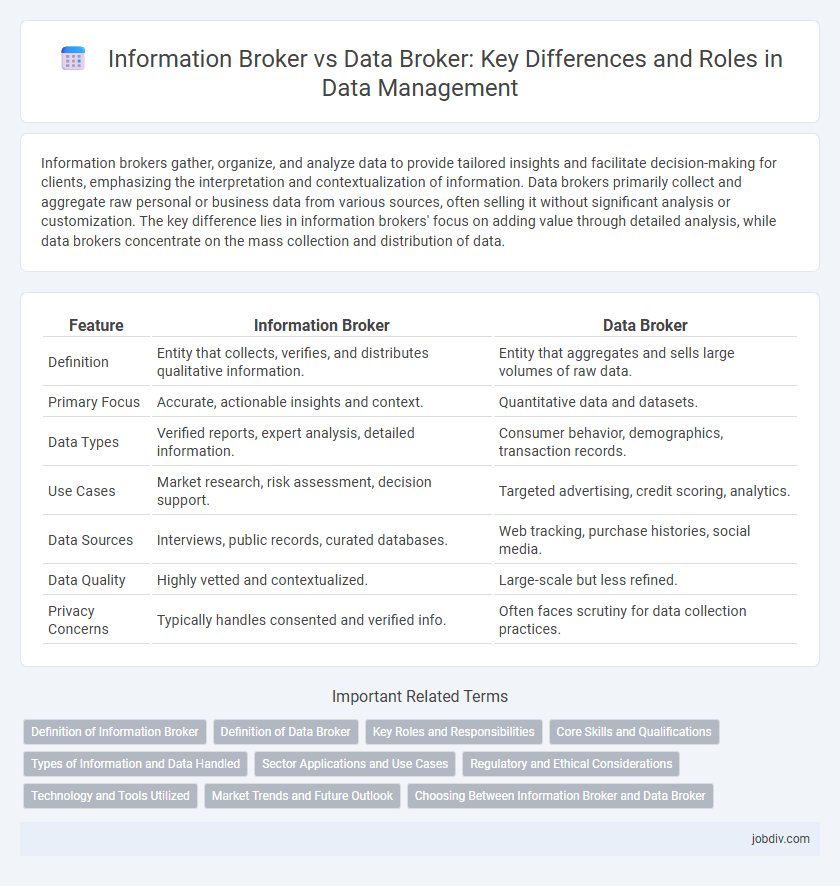Information brokers gather, organize, and analyze data to provide tailored insights and facilitate decision-making for clients, emphasizing the interpretation and contextualization of information. Data brokers primarily collect and aggregate raw personal or business data from various sources, often selling it without significant analysis or customization. The key difference lies in information brokers' focus on adding value through detailed analysis, while data brokers concentrate on the mass collection and distribution of data.
Table of Comparison
| Feature | Information Broker | Data Broker |
|---|---|---|
| Definition | Entity that collects, verifies, and distributes qualitative information. | Entity that aggregates and sells large volumes of raw data. |
| Primary Focus | Accurate, actionable insights and context. | Quantitative data and datasets. |
| Data Types | Verified reports, expert analysis, detailed information. | Consumer behavior, demographics, transaction records. |
| Use Cases | Market research, risk assessment, decision support. | Targeted advertising, credit scoring, analytics. |
| Data Sources | Interviews, public records, curated databases. | Web tracking, purchase histories, social media. |
| Data Quality | Highly vetted and contextualized. | Large-scale but less refined. |
| Privacy Concerns | Typically handles consented and verified info. | Often faces scrutiny for data collection practices. |
Definition of Information Broker
An Information Broker specializes in gathering, analyzing, and selling detailed personal or corporate information to clients for various purposes, including market research, risk management, and background checks. Unlike Data Brokers, who primarily collect and aggregate vast amounts of raw data from multiple sources, Information Brokers focus on verifying, interpreting, and providing actionable insights derived from that data. Their expertise lies in transforming raw data into valuable intelligence tailored to specific client needs.
Definition of Data Broker
A data broker collects, aggregates, and sells personal information from various sources without direct interaction with the individuals involved. This data is then used for marketing, risk management, and analytics purposes across multiple industries. Unlike information brokers, data brokers focus primarily on raw data compilation rather than providing tailored information services.
Key Roles and Responsibilities
Information brokers specialize in collecting, verifying, and analyzing publicly available data to provide detailed reports and insights for businesses and individuals. Data brokers aggregate vast amounts of personal and commercial data from various sources, focusing on organizing, categorizing, and selling this data to marketers, advertisers, and other third parties. Both roles require strict adherence to data privacy regulations while optimizing data accuracy and usability for their respective clients.
Core Skills and Qualifications
Information brokers excel in research, data analysis, and information verification, requiring strong investigative skills and expertise in data privacy regulations. Data brokers specialize in data aggregation, profiling, and market analysis, demanding proficiency in data management, statistical tools, and compliance with consumer protection laws. Both roles prioritize attention to detail, critical thinking, and the ability to synthesize large datasets into actionable insights.
Types of Information and Data Handled
Information brokers specialize in gathering and distributing publicly available personal and business information such as contact details, social media profiles, and market research data. Data brokers, on the other hand, collect extensive datasets including consumer behavior, purchasing history, geographic location, and sensitive financial records from various sources like credit agencies and online tracking tools. The distinction lies in information brokers handling curated, often qualitative data, while data brokers focus on large-scale, quantitative datasets for analytics and targeted marketing.
Sector Applications and Use Cases
Information brokers specialize in aggregating and analyzing qualitative data for sectors like journalism, legal services, and competitive intelligence, providing tailored insights to support decision-making and risk assessment. Data brokers collect and sell large volumes of quantitative data, commonly used in marketing, finance, and insurance industries to drive customer profiling, targeted advertising, and fraud detection. Both serve critical roles in sectors such as healthcare, retail, and government by enabling personalized services, regulatory compliance, and strategic planning through comprehensive data handling and analysis.
Regulatory and Ethical Considerations
Information brokers focus on collecting and selling personal data for specific client needs, while data brokers aggregate vast datasets from multiple sources for broader commercial uses. Regulatory frameworks like GDPR and CCPA impose strict consent and transparency requirements, with data brokers facing higher scrutiny due to their extensive data aggregation practices. Ethical considerations emphasize user privacy rights, data accuracy, and the potential for misuse, demanding robust compliance and accountability from both broker types.
Technology and Tools Utilized
Information brokers leverage advanced data aggregation platforms, artificial intelligence, and machine learning algorithms to collect, analyze, and synthesize diverse datasets from public and proprietary sources. Data brokers primarily utilize automated data collection tools, such as web crawlers, APIs, and data mining software, to gather massive volumes of personal and transactional data. Both rely heavily on cloud computing, big data analytics, and secure data management systems to ensure efficient processing and storage.
Market Trends and Future Outlook
Information brokers specialize in collecting and analyzing diverse data sets to provide tailored insights, while data brokers primarily aggregate and sell consumer data collected from various sources such as online activity and public records. The market trends indicate a growing demand for ethical data management and enhanced privacy compliance, driving innovation in secure data handling technologies and transparent practices. Future outlook forecasts a shift towards AI-driven analytics and stricter regulatory frameworks, reshaping how information and data brokers operate within evolving digital ecosystems.
Choosing Between Information Broker and Data Broker
Choosing between an information broker and a data broker depends on the specific needs for data collection and analysis. Information brokers specialize in aggregating, verifying, and providing detailed, context-rich insights from diverse sources, while data brokers primarily focus on collecting and selling raw, large-scale datasets often without deep contextualization. Evaluating the importance of data accuracy, granularity, and the intended use case is crucial in making an optimal choice between these services.
Information Broker vs Data Broker Infographic

 jobdiv.com
jobdiv.com